Handling and Features
Performance
Verdict
Specification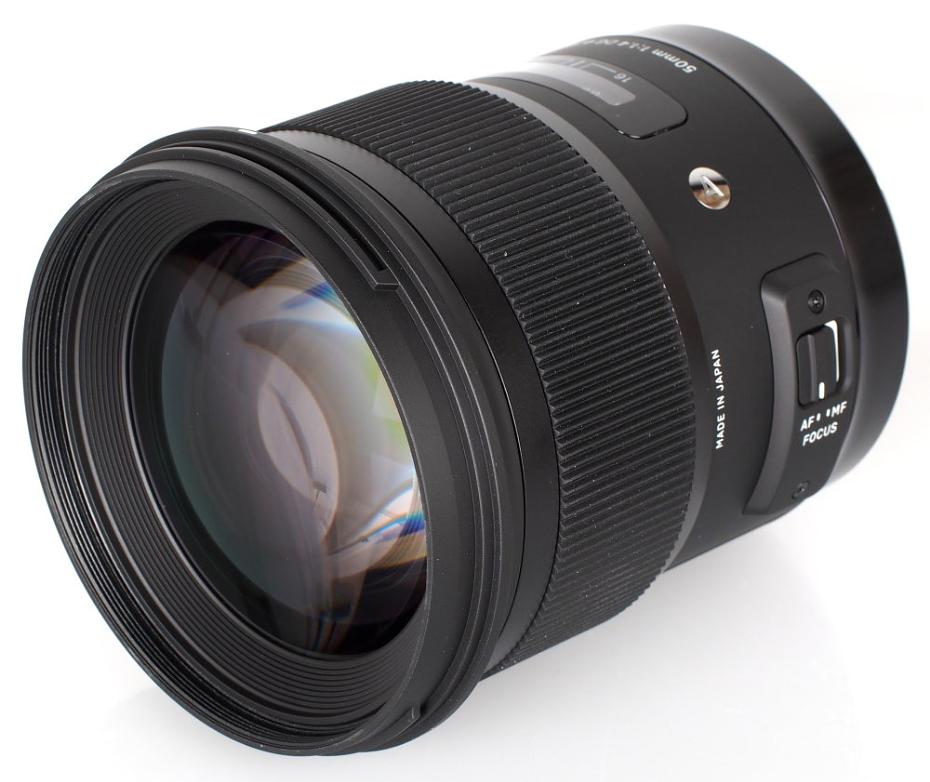
Sigma has added to their 'Art' range of fast aperture lenses with this new 50mm f/1.4 lens, which will be available to fit Canon, Nikon, Sony and Sigma SLR cameras. This lens costs around £850, which seems like an awful lot for a 50mm f/1.4 lens. However, this lens is pitched as a premium optic to compete with the likes of Nikon's 58mm f/1.4G lens, or Canon's 50mm f/1.2L which both cost well over £1000. In this review, we'll take a look at how it performs.
Sigma 50mm f/1.4 DG HSM Art Handling and Features
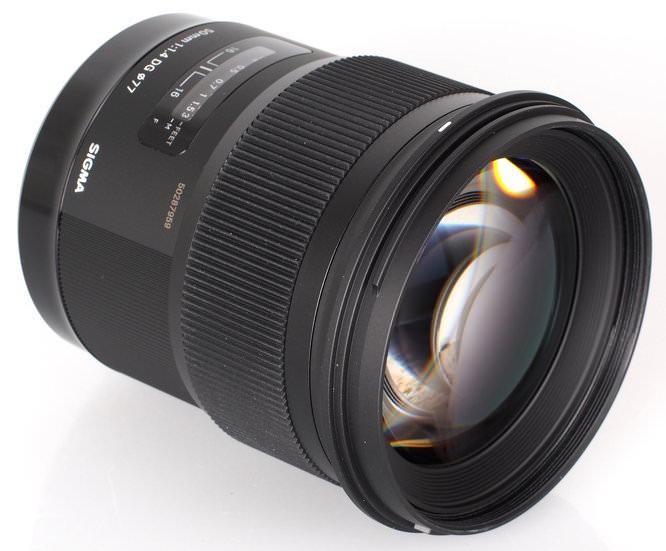
Those expecting a classic, compact 50mm f/1.4 lens will be taken aback by the size and weight of this optic. It tips the scales at 815g, is almost 10cm long without the hood and takes 77mm filters. Even so, the lens balances well with the Canon EOS 5D Mk III body used for testing. Build quality is excellent, with high quality plastics with a brushed metal effect finish used for much of the lens barrel and brass used for the bayonet, which adds to the quality impression the lens conveys. However, no claims are made about the weather resistance of the lens.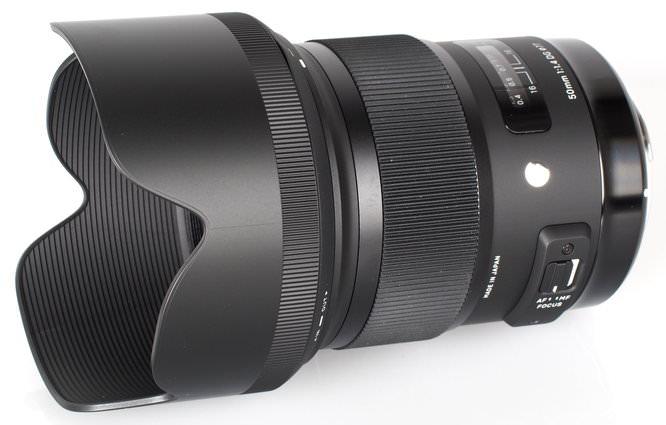
A silent HSM focusing motor powers the focusing mechanism, which is very quick to confirm focus and accurate, even at maximum aperture. If your sample of this lens does exhibit focusing errors, this lens supports Sigma's new USB Dock accessory, which allows focus adjustments and firmware updates to be applied to the lens, quickly and easily. Focusing is performed internally, so the 77mm filter thread does not rotate, making this lens ideal for use with polarising and graduated filters. The supplied petal-shaped hood fits to the front of the lens via a bayonet fitting.
Full time manual focus can be applied by simply adjusting the focus ring at any time. Manual focusing is a pleasure as the focus ring is very smooth to operate and quite heavily damped. Closest focusing is 40cm from the sensor plane, which is fairly typical for a lens of this focal length and aperture.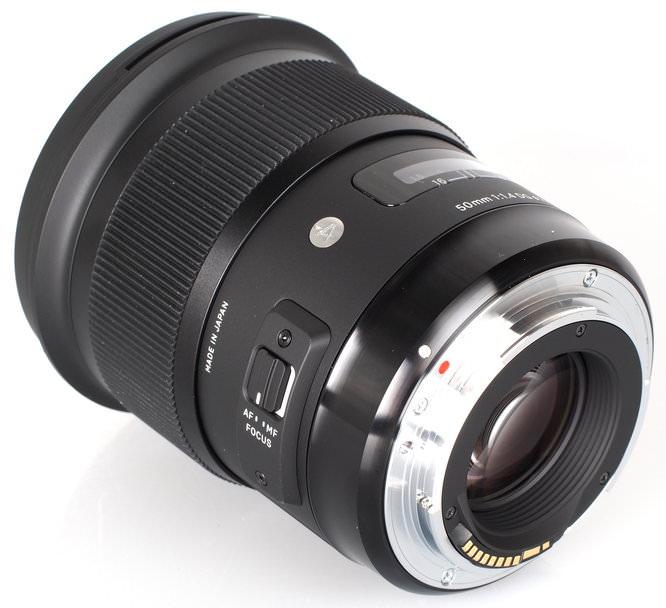
Sigma 50mm f/1.4 DG HSM Art Performance
As far as sharpness is concerned, this lens puts in an excellent performance, especially in the centre of the frame. At f/1.4, sharpness in the centre is already outstanding, although clarity towards the edges of the frame lags behind somewhat. Sharpness towards the edges of the frame improves as the aperture is stopped down, reaching very good levels by f/2.8 and outstanding levels by f/4.
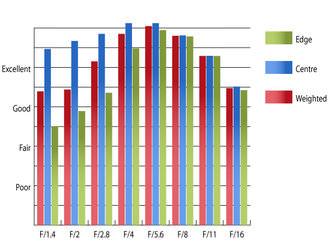 MTF MTF |
How to read our chartsThe blue column represents readings from the centre of the picture frame at the various apertures and the green is from the edges. Averaging them out gives the red weighted column.The scale on the left side is an indication of actual image resolution. The taller the column, the better the lens performance. Simple. For this review, the lens was tested on a Canon EOS 5D Mark III using Imatest. |
Chromatic aberrations are virtually non-existent, with Imatest only able to detect fringing of a quarter of a pixel width towards the edges of the frame at f/1.4. This is exceptional performance, which will allow shooting of high contrast subjects with no qualms or worries.
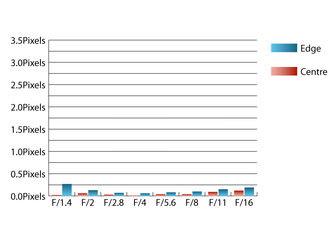 CA |
How to read our chartsChromatic aberration is the lens' inability to focus on the sensor or film all colours of visible light at the same point. Severe chromatic aberration gives a noticeable fringing or a halo effect around sharp edges within the picture. It can be cured in software.Apochromatic lenses have special lens elements (aspheric, extra-low dispersion etc) to minimize the problem, hence they usually cost more. For this review, the lens was tested on a Canon EOS 5D Mark III using Imatest. |
Falloff of illumination towards the corners of the frame is fairly typical for a lens of this focal length and maximum aperture. At f/1.4 the corners are 2.17 stops darker than the image centre and visually uniform illumination is achieved with the aperture stopped down to f/4 or beyond.
Imatest detected 0.349% barrel distortion, which is virtually indistinguishable. This low level of distortion should rarely require correction, but if it does, you'll be glad to know the distortion pattern is uniform across the frame.
A deep petal-shaped hood is supplied with this lens, which does a good job of shielding the lens from extraneous light that may cause loss of contrast or flare. Even when shooting into the light, contrast remains good and flare is virtually non-existent.
Sigma 50mm f/1.4 DG HSM Art Sample Photos
Value For Money
On paper, seeing this lens simply as another 50mm f/1.4 lens, the £850 asking price does seem a little steep. With the performance this lens delivers taken into account it makes much more sense, representing very good value for money. For example, comparisons may be made between this lens and similar optics, like Canon's 50mm f/1.2L, which costs around £1245, and Nikon's 58mm f/1.4G, which costs around £1450.
Sigma 50mm f/1.4 DG HSM Art Verdict
Overall, with this lens Sigma have created a lens which performs well in terms of sharpness and other optical attributes, for a fairly reasonable price. This combination of price versus performance will almost certainly win many fans for this lens, even despite its large size and weight for a 50mm optic.
The Sigma 50mm f/1.4 DG HSM Art is a lens that delivers outstanding performance at a reasonable price.
With thanks to HarrisonCameras for providing the Canon EOS 5D Mark III.







